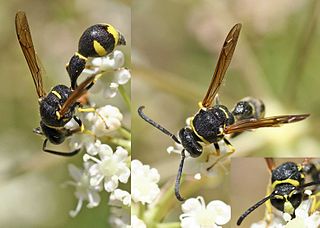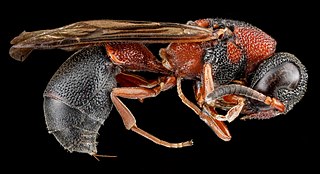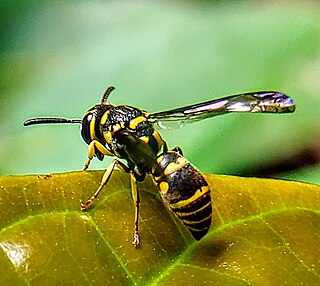
Eumenes is the type genus of the subfamily Eumeninae of Vespidae. It is a large and widespread genus, with over 100 taxa, mostly occurring in the temperate portions of the Northern Hemisphere. Most species are black or brown, and commonly marked with strikingly contrasting patterns of yellow, white, orange, or red. Like most vespids, their wings are folded longitudinally at rest. The first metasomal segment is narrow and elongated, creating a "bulbous" appearance to the abdomen.

Leptochilus is a large, mostly Holarctic genus of small sized potter wasps. The genus reaches its largest diversity in the Palearctic where there are more than 135 species belonging to 5 subgenera. However the division of The division of Leptochilus into subgenera can not be fully supported and the status of some of them is dubious.

Delta is an Old World genus of potter wasps with species predominantly distributed through tropical Africa and Asia. Some species are present in the Palearctic region, and a few have been introduced in the Nearctic and Neotropical regions. The members of this genus have a long metasomal petiole, like members of the genera Eumenes and Zeta.
Ischnocoelia is an Australian genus of potter wasps. The species currently recognised under this genus are:

Stenodyneriellus is an Australasian and Indomalayan genus of potter wasps.
Subancistrocerus is an Australian, Indomalayan, African and Palearctic genus of potter wasps. Males of this genus used to have an enlarged antennal tip.
Knemodynerus is a genus of potter wasps distributed through the Palearctic, Afrotropical, Indomalayan and Australasian regions. The species currently classified in the genus are:

Rhynchium is an Australian, Afrotropical, Indomalayan and Palearctic genus of potter wasps.
Eustenancistrocerus is an Afrotropical, Palearctic and Oriental genus of potter wasps. The species in this genus include:
Ischnogasteroides is an Afrotropical and Palearctic genus of potter wasps. It currently includes the following species:
Micreumenes is an Afrotropical genus of potter wasps with 30 described species.
Paravespa is an Afrotropical and Palearctic genus of potter wasps.
Pareumenes is an Afrotropical, Palearctic and Oriental genus of potter wasps.
Pseudepipona is a genus of potter wasps found in the Palearctic, Nearctic, Afrotropical and Australian regions.
Pseudodontodynerus is a genus of potter wasps distributed throughout the Palearctic, Indomalayan and Afrotropical regions.
Pseudonortonia is a fairly large genus of potter wasps with a rich Afrotropical fauna, as well as with several species which occur throughout the Palearctic and Indomalayan regions.
Jucancistrocerus is a Palearctic genus of potter wasps. The currently species assigned to Jucancistrocerus are:
Labus is an Indomalayan genus of potter wasps. It contains the following species:
Onychopterocheilus is a Palearctic genus of potter wasps.

Phimenes is an Indomalayan and Australasian genus of potter wasps. The genus was formerly regarded as a synonym of Delta. The genus was separated from Eumenes by the Italian hymenopterist Antonio Giordani Soika when he elevated division IV of Eumenes, which Saussure had given the name Phi to, to full generic status. However, Giordani Soika noted that the name Phi was preoccupied by a subgenus of the New World polistine genus Mischocyttarus and he therefore chose to compound Phi with Eumenes into Phimenes as the name for the new taxon.






